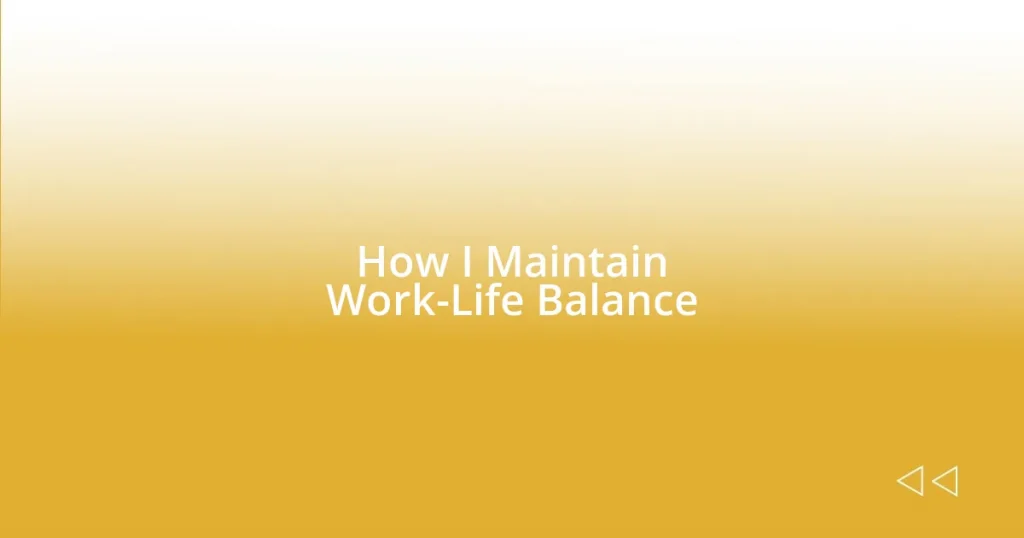Key takeaways:
- Maintaining work-life balance is crucial for well-being, productivity, and preventing burnout.
- Setting clear boundaries, such as turning off work notifications after hours, fosters a supportive work environment.
- Task prioritization techniques, like the Eisenhower Matrix, enhance focus and reduce stress.
- Regular self-evaluation and adjustments to personal and work commitments lead to improved balance and fulfillment.
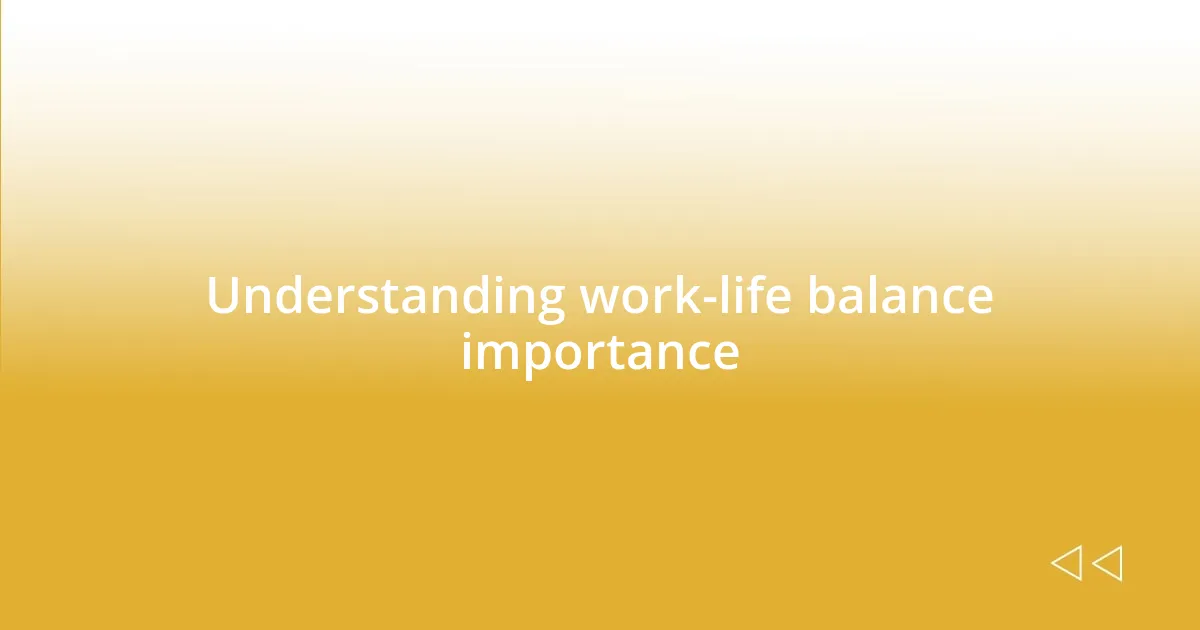
Understanding work-life balance importance
Work-life balance is not just a trendy buzzword; it’s vital for our overall well-being and productivity. I can recall a time when I firmly believed that working long hours translated to success. But the truth hit me hard when I found myself exhausted and irritable, making mistakes that I wouldn’t have otherwise. Has this ever happened to you, where the stress of work overshadowed your happiness?
Achieving a healthy work-life balance is important because it nurtures our relationships and personal well-being. I noticed that when I prioritized my personal time, like family dinners or quiet moments with a book, my mood improved significantly. When was the last time you felt truly refreshingly off the clock? It’s moments like those that not only recharge our energy but also enhance our creativity and problem-solving skills at work.
Moreover, maintaining this balance can prevent burnout, which I can attest is a real danger in our fast-paced world. I once pushed myself to meet every deadline, neglecting self-care. It led to a point where I dreaded going to work. Reflecting on that experience taught me how interconnected our professional and personal lives really are. Wouldn’t you agree that a thriving personal life can fuel a more productive work life?
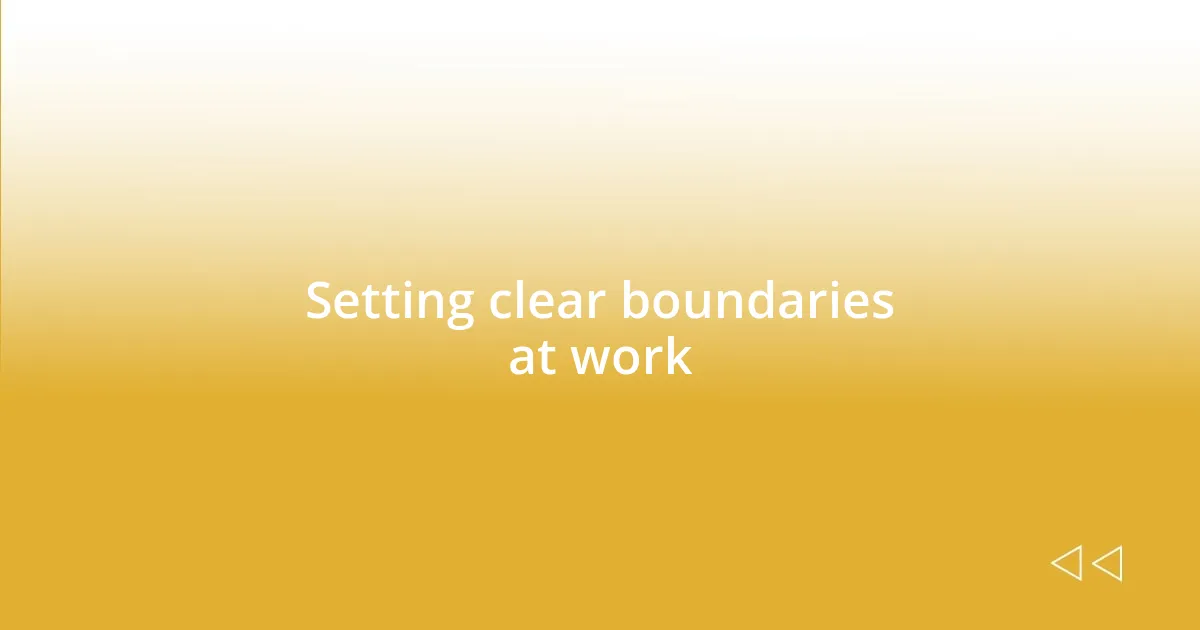
Setting clear boundaries at work
Setting clear boundaries at work is essential for maintaining my well-being and productivity. I learned the hard way that constantly checking emails after hours blurred my personal and professional lines. I remember a weekend when I couldn’t enjoy a family outing because I was fixated on work-related notifications. That experience pushed me to establish specific work hours and stick to them. How do you manage interruptions outside of work hours?
Creating a clear delineation between work and home life allows me to recharge effectively. I started turning off work notifications after a certain time, and surprisingly, the world didn’t fall apart! Taking that simple step gave me back my evenings. It not only improved my mood but also provided space for hobbies and interactions with friends. Have you ever experienced a similar shift when you decided to prioritize your personal time?
Additionally, sharing my boundaries with colleagues has transformed my work environment. When I express my non-negotiable hours, I empower my teammates to do the same. I recall a moment when a colleague and I both decided to unplug from work around the same time, and it felt liberating. Together, we established a culture of respect for personal time at work. Isn’t it refreshing to think that setting boundaries can foster a more supportive team atmosphere?
| Boundary Setting Action | Benefits |
|---|---|
| Turning off notifications after hours | Increased personal time and reduced stress |
| Communicating availability clearly | Fosters respect among colleagues |
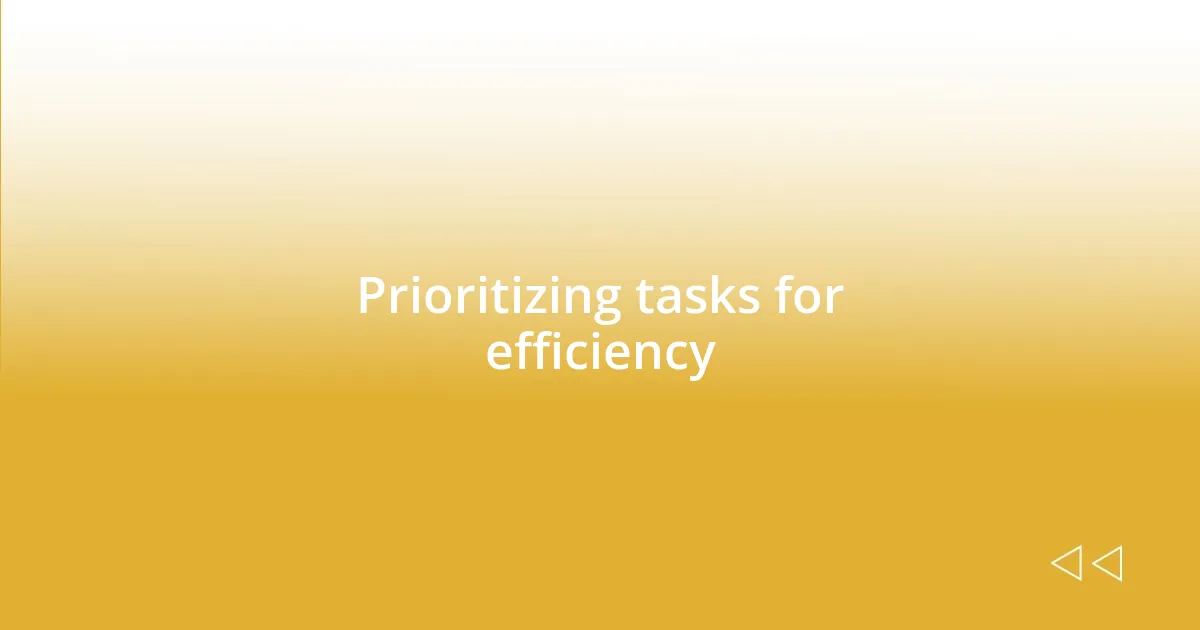
Prioritizing tasks for efficiency
When I prioritize my tasks, it feels like I’m navigating a well-charted map rather than wandering aimlessly. Early in my career, I used to jump from one task to another based on incoming demands, which often felt chaotic. It wasn’t until I experimented with task prioritization techniques, like the Eisenhower Matrix, that I truly found clarity. This simple tool helped me categorize tasks by urgency and importance, making it much easier to focus on what genuinely matters. Have you tried identifying your top three priorities for the day?
- Urgent and Important: These tasks require immediate attention, like deadlines or critical client requests. I often tackle these first thing in the morning.
- Important but Not Urgent: These are strategic tasks that can have lasting impacts, such as planning or long-term projects. I set aside time every week to focus on these.
- Urgent but Not Important: Tasks that demand immediate action but don’t contribute significantly to my goals. I often delegate these.
- Neither Urgent Nor Important: These tasks can be postponed or eliminated altogether. I find that my workload lightens significantly when I take a hard look at this category.
By classifying my tasks this way, I’ve noticed I don’t just get more done, but I also feel more accomplished and less stressed. There’s something incredibly satisfying about checking off the right boxes instead of just being busy. Have you felt that rush of accomplishment when the right tasks align?
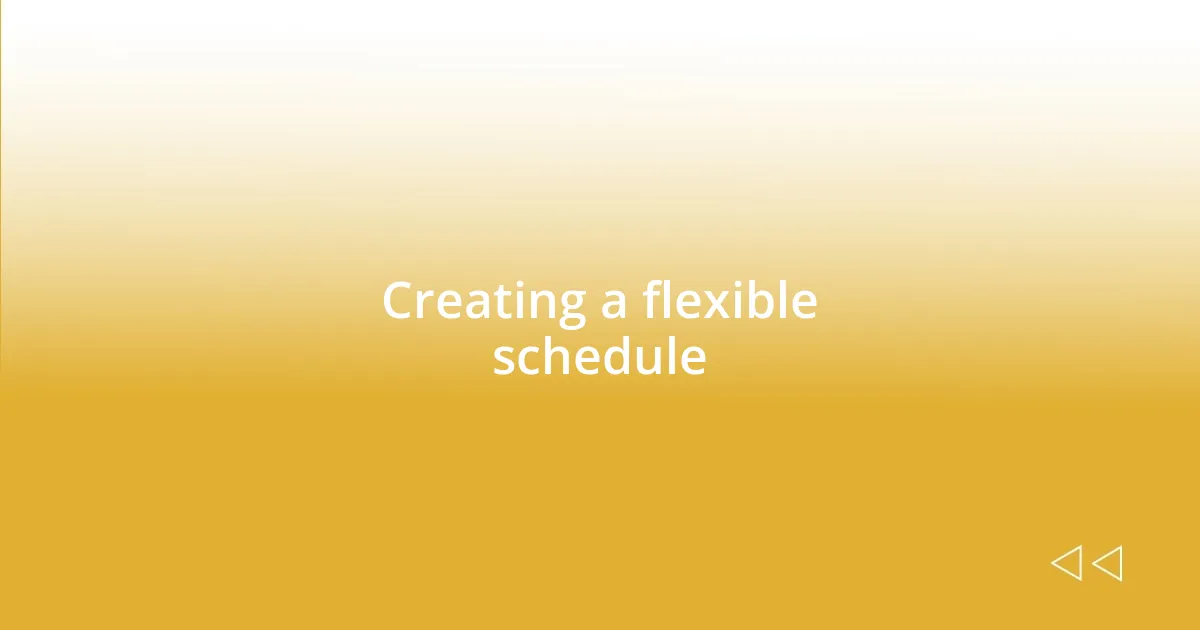
Creating a flexible schedule
Creating a flexible schedule has been a game changer for me. I learned to embrace a fluidity in my daily routine that accommodates both work demands and personal life. For instance, I often block out time for focused work but leave gaps for spontaneous breaks. This way, I can adjust my plans if something unexpected comes up, like a lunch invite from a friend or a sudden burst of inspiration for a project at home. How often do you find yourself resisting changes to your schedule, only to realize you could benefit from a little spontaneity?
One practical approach I adopted is time-blocking, where I allocate specific hours for different activities. For example, I usually schedule a couple of hours in the morning for deep work, followed by flexible slots for meetings and family time. I vividly remember a particular Thursday when I decided to shift my afternoon work hours to spend more time with my kids before dinner. It felt refreshing and reinforced how crucial flexibility is for my well-being. Have you had experiences where a little adjustment made all the difference?
Moreover, I’ve found that checking in with myself regularly about my schedule leads to better outcomes. Every Sunday, I review what’s ahead for the week and make necessary adjustments, based on both work obligations and personal needs. That simple ritual gives me a sense of control, allowing me to enter the week with clarity. It really does help to set aside moments for reflection. Have you taken the time to assess whether your current schedule aligns with your goals and values?
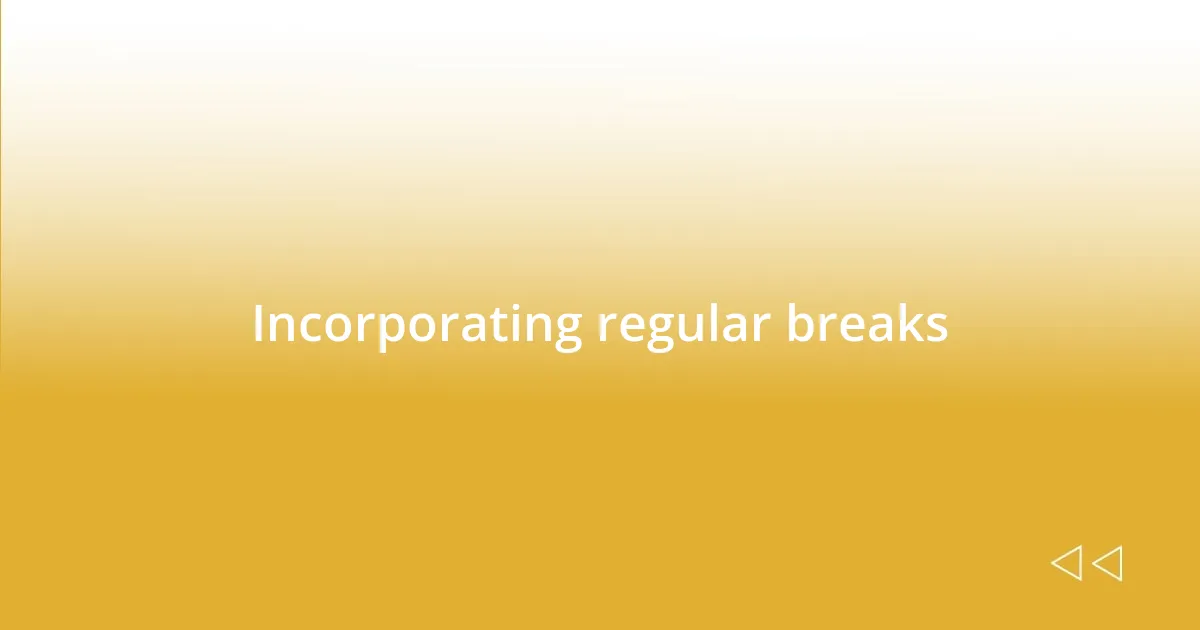
Incorporating regular breaks
Incorporating regular breaks into my workday has been a revelation. I remember a particularly stressful project where I pushed through long hours, hoping to catch up. Instead, my productivity took a nosedive, and I felt mentally drained. After that experience, I started using the Pomodoro Technique, which involves working for 25 minutes and then taking a 5-minute break. I can honestly say those short pauses have transformed my focus and energy levels. Have you ever noticed how stepping away can spark creativity?
On days when I’m buried in deadlines, I ensure I schedule longer breaks, too. For instance, I treat myself to a brisk walk outside or a few minutes of meditation. These breaks not only refresh my mind but also provide clarity when I return to my tasks. I still vividly recall a day when a quick coffee break turned into a realization on how to tackle a stubborn problem. It’s amazing what a little distance can do for perspective. Do you give yourself permission to pause, or do you find it difficult?
I’ve also learned that making breaks enjoyable can elevate my overall mood. Whether it’s listening to my favorite podcast, enjoying a few pages of a good book, or chatting with a colleague, I prioritize moments that truly recharge me. Those intervals aren’t just time away from my desk; they’re essential investments in my mental health and productivity. Have you explored ways to make your breaks more fulfilling? Incorporating regular breaks has become a non-negotiable part of my routine, and I encourage you to consider how they can enhance your work-life balance, too.

Engaging in hobbies and leisure
Engaging in hobbies and leisure is crucial for me; it’s an essential part of maintaining my work-life balance. I remember the first time I picked up painting again after years of neglect—my whole perspective shifted. It felt invigorating to blend colors on canvas, completely losing myself in the process. How often do we forget to reconnect with what truly brings us joy?
I’ve also discovered that my love for gardening serves as a grounding exercise. There, among the plants and the soil, I find a sense of peace that counters the chaos of work. I recall a particularly hectic week when I just needed to clear my head. Stepping outside to tend to my flowers completely reset my mood and energy. Do you have an activity that helps you recharge?
Diving into hobbies also fosters creativity, something I never anticipated. I like to experiment with cooking new recipes, which not only satisfies my culinary curiosity but often leads to delicious discoveries. One evening, I tried my hand at a spicy Moroccan tagine, and the joy of sharing that meal with friends felt rewarding beyond measure. Have you considered how a simple hobby might inspire you in unexpected ways? Harnessing these moments of leisure not only enriches my life; it forms a vital part of my well-being strategy.
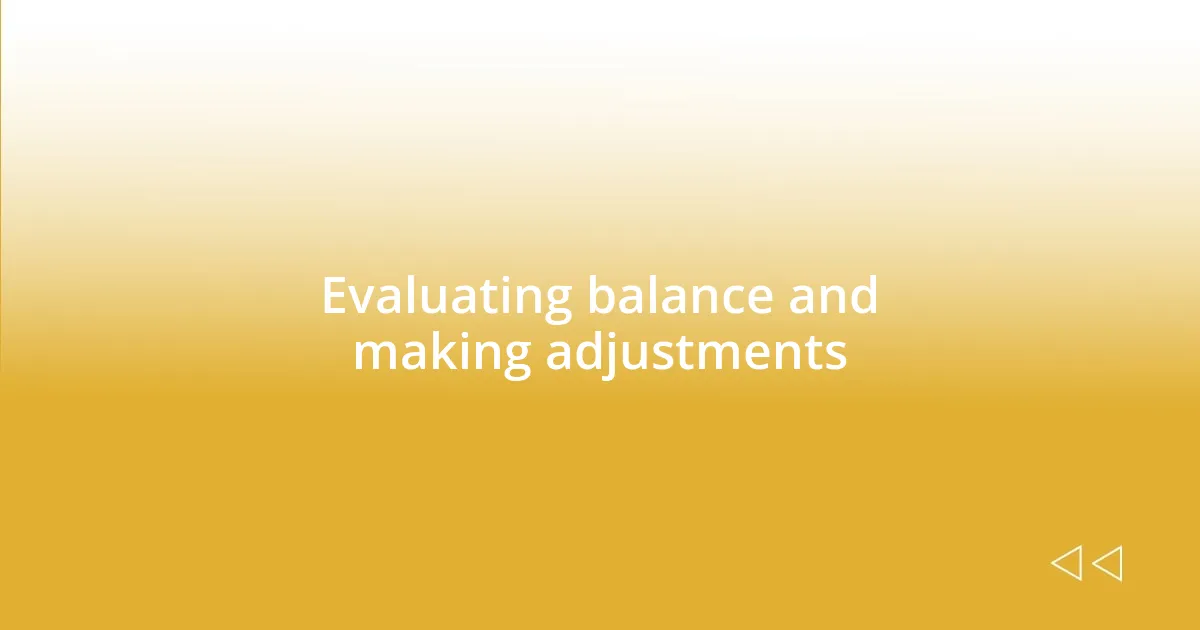
Evaluating balance and making adjustments
Evaluating my work-life balance regularly is something I’ve come to value deeply. For instance, at the end of each month, I reflect on how I’ve spent my time—both at work and in my personal life. I remember a moment when I realized I hadn’t made time for family outings due to an overwhelming work schedule. This insight prompted me to adjust my commitments, ensuring I prioritize those special moments with loved ones.
In my experience, making small adjustments can lead to profound changes. One of those adjustments was implementing “no work” weekends. Initially, I was apprehensive, thinking I’d fall behind. However, I quickly learned that those two days of unadulterated time off rejuvenated my spirit and helped me return to work more focused. Have you ever considered how a short break could actually enhance your productivity rather than hinder it?
Being attuned to my emotions has also played a key role in maintaining that balance. When I feel overwhelmed, I ask myself why and seek tangible solutions. One particularly taxing week made me realize I wasn’t delegating tasks effectively. After acknowledging that, I began to communicate more openly with my team, which not only eased my stress but fostered collaboration. Have you been in a situation where recognizing your feelings allowed you to pivot successfully? Evaluating and adjusting my balance is an ongoing journey, but I’ve found it to be incredibly rewarding.










